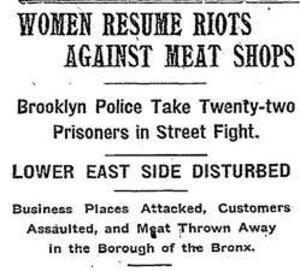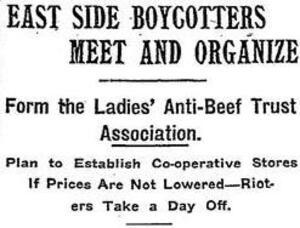Jewish women protest kosher meat prices on Lower East Side
On May 15, 1902, Jewish housewives on the Lower East Side poured into the streets, breaking windows and throwing meat. The women were protesting a jump in the price of kosher meat from 12 to 18 cents a pound. Food prices were often a source of contention for Jewish immigrant communities in New York. The May 1902 boycott highlighted the ability of Jewish women to organize and coordinate a movement throughout the boroughs. The event made headlines across the city, with some newspapers cheering on the women and others condemning them.
In early May of 1902, as the price of kosher meat rose, neighborhood butcher shops stopped selling meat in order to try to force wholesalers, often referred to as the Meat Trust, to cut their prices. The Meat Trust refused to budge and prices remained high. Unhappy with the lack of progress made by the butcher shop boycott, female consumers took matters into their own hands.
On May 14, two women organized a meeting on the Lower East Side to rally support for the proposed boycott. The next day, tens of thousands of Jewish women took to the streets and demonstrated their outrage. Riots broke out as women attacked butcher shops and customers. Police officers tried to protect butcher shops, but protesting women grabbed meat and threw it out into the streets, even dousing it in gasoline and setting it on fire. Police arrested 85 people, three quarters of them women. Encouraged by the Lower East Side, women in other neighborhoods began their own boycotts.
Protest tactics were not strictly reserved for the streets. On May 17 during Shabbat Torah services, women interrupted prayers with a call to support the boycott. Women left their seats in the balcony to persuade men to back their cause and gain communal support.
To ensure solidarity, women patrolled the neighborhood. Canvassers traveled door-to-door to encourage neighbors to support the boycott. Home visits also allowed women to look into pots to make sure no secretly purchased meat was being cooked. Supporters picketed butcher shops. Sympathetic neighbors raised bail money for women who had been arrested. Fliers illustrated with skulls and cross bones warned: "Eat no meat while the Trust is taking meat from the bones of your women and children."
The press noted the women’s impressive organization and strategy. The New York Herald reported that "these women were in earnest. For days they had been considering the situation, and when they decided on action, they perfected an organization, elected officers, ...and even went so far as to take coins from their slender purses until there was an expense fund of eighty dollars with which to carry on the fight."
Three weeks into the boycott, the price of kosher meat was lowered four cents when the Meat Trust agreed to drop prices to 14 cents a pound. Even though prices would rise again, the boycott had mobilized and politicized a group not traditionally involved in organized protest. Unlike most women involved in the labor movement in this period, the women who participated in the boycott were mostly homemakers in their thirties. Although mainly immigrants, most of the women had been living in the United States for many years and were asserting what they saw as American rights—the right to demand fair prices, the right to protest publicly, and the right to speak freely and openly. The boycott would become a model for future protests and was in many ways a precursor to larger scale strikes, including the 1909 shirtwaist strike.
Sources Hyman, Paula E. “Immigrant Women and Consumer Protest: The New York Kosher Meat Boycott of 1902.” in The American Jewish Experience, edited by Jonathan D. Sarna (1997); Eldridge Street Synagogue Audio Clips (1 and 2).





link is not working